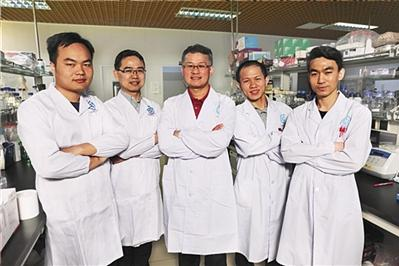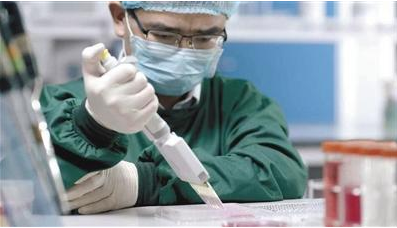
A group photo of the research team of Qi Duanqing's research group. Image for this edition / Photo courtesy of respondents

The researchers added "magic potions" to the cells. The so-called "magic potion" is precisely the state of the cell chromatin "cue string" that is precisely regulated by drugs.
Finding ways to achieve “rejuvenation†is almost throughout human history. This dream may become a reality in the laboratory of contemporary biological researchers.
Yan Duanqing and his team at the Guangzhou Institute of Biomedicine and Health, Chinese Academy of Sciences (hereinafter referred to as the Guangzhou Institute of Biological Sciences, Chinese Academy of Sciences), after five years, studied ways to induce cells to return to a young state through chemical methods. In the experiment, by preparing "magic potion", the experimental cells "bath" and change their chemical structure, they can control the direction of cell fate transformation.
The biology community believes that although Duan Duanqing's research is still in the experimental stage, it has important practical significance. At present, relevant research results papers have been published in the core journal of international cytology.
Technical means to reverse back to stem cell status
In the research team of the Guangzhou Institute of Biological Sciences of the Chinese Academy of Sciences, in order to find a way to achieve "rejuvenation," it is first necessary to clarify the causes of human aging and the internal principles.
According to Yan Duanqing, all the cells in the human body are derived from stem cells. Current research suggests that the physiological aging of the human body is the result of a combination of stem cell decline, DNA degradation, and aging gene activity.
Because stem cells have unlimited proliferation and multi-directional differentiation, full of vitality and plasticity, in the view of the Qi Duanqing team, stem cells are no different from "newborn babies." On this basis, if various cells can be reversed back to a state similar to stem cells by technical means and become "inducible pluripotent stem cells (iPScells)", physiological "rejuvenation" can be achieved.
In addition, induced pluripotent stem cells can be used to regenerate new tissues and organs, providing a source of "seed" cells for disease treatment and regenerative medicine.
In fact, before this, the international biology community has explored this path. The 2012 Nobel Prize in Physiology and Medicine, a Japanese biologist, Yamanaka Yamanaka, led a research team in 2006 and found ways to induce mouse cells to "transform" into embryonic stem cells.
According to the Guangzhou Institute of Biological Sciences of the Chinese Academy of Sciences, Yamanaka's method is to introduce four genes into the adult cells of mice through viral vectors, and then transform them into embryonic stem cells. The stem cells obtained by the method can avoid the problem of immune rejection, and are used for preparing various tissues and organs of autologous origin, which is called "Shanzhong Yanmi method" by the industry, and the four genes introduced are called "Shanzhong Dimu factor".
However, the “Shanzhong method†uses viral vectors for gene delivery, which has potential cancer-causing risks and may be clinically used. Since then, the academic community has used chemical small molecules to replace the "mountain in the mountains", but there are still many shortcomings such as many steps, long time, low efficiency, and unclear mechanism.
Give the cell a "bath" with "magic potion"
In the face of the deficiencies of the “Shanzhong methodâ€, on the basis of previous studies, since 2013, the team of the Guangzhou Institute of Biological Sciences, Qi Duanqing of the Chinese Academy of Sciences, has begun to try new solutions.
Yan Duanqing said that the reason why adult cells can not return to the stem cell state is because they are locked by transcription factors. If there is no password, they cannot move forward. For example, open chromatin sites are surrounded by transcription factors such as AP-1 and ETS; in embryonic stem cells, transcription factors such as OCT, SOX and KLF are retained.
"Actually, the cell's 'rejuvenation' is the process of opening to closing, closing and then opening." Yan Duanqing said that by further researching the mechanism of "unlocking" the password for a single small molecule drug, team members found that the key small molecule Brdu, which acts directly on the DNA structure itself, regulates the chromatin state.
"Brdu is a simple nucleoside analog that can drive the reversal of cell fate and provide a breakthrough in the development of small molecules that are more efficient and simple for cell rejuvenation," said Duan Duanqing.
This is not the first time that Duan Duanqing and his team have discovered such a "key small molecule." As early as 2009, Qi Duanqing's laboratory confirmed that vitamin C can improve the cell fate reversal efficiency, from one ten thousandth to 10%, thus resisting aging. This experimental result was selected as a cover article, published in the "Cellstemcell" magazine, which is the first time that relevant scientific research results from China have won this honor. In addition, the research results of Qi Duanqing's team on urine conversion efficiency were also widely published by Nature's official website.
After five years of research, the team of Qi Duanqing prepared stem cells by chemical methods, and proposed new perspectives and solutions for optimizing the preparation route. Yan Duanqing said that this chemical method can be understood as preparing a set of "magic potions" and "bathing" cells. After this process, a variety of somatic cell types can become stem cells.
Unlock cell fate "password"
Qi Duanqing's preparation method is called "compound-induced stem cell pluripotency", which is abbreviated as CIP. In this program, two different "drugs" are needed to "bath" the cells in sequence, which is simpler and more efficient than the previous ones, and requires less initial cells. More importantly, this method can achieve a variety of somatic cell types "rejuvenation", including liver cells that are extremely difficult to culture in vitro.
How does "magic potion" return adult cells to the stem cell state of early embryonic development? According to Qi Duanqing, in the individual, all cells have the same chromatin, and the various cells with different shapes and functions are formed because the cells are constrained before the identifiable morphological changes occur. Differentiate in a specific direction. This constraint determines the future developmental consequences of the cell.
The Qi Duanqing team found that this "instruction" that constrains cell morphological changes comes from the chromatin state inside the nucleus. The opening and closing of the chromatin of the cell constitutes a state that determines the fate of the cell. "This situation is like a computer binary 'password string', which in turn locks the cell in a specific state."
The so-called "magic potion" is precisely the state of the cell chromatin "cue string" that is precisely regulated by drugs. In the process, a group of drugs is first used to “unlock†the somatic cell fate state, and then another group of drugs is used to drive the cell fate to the pluripotent stem cell state, thereby realizing the “rejuvenation†of the cells.
“Because no foreign genes are introduced, this method is easy to operate, the process conditions are uniform, all components are clear and standardized, and it will provide a safe and efficient preparation method for stem cell applications.†Duan Duanqing said that the new preparation method will have a broad Market application prospects. At the same time, it will provide a new direction for the development of drugs to induce cell fate transformation, "to promote the development of stem cells and regenerative medicine, and to serve the medical and health undertakings in China."
Expert: It is of great significance after extensive application
Many biologists pointed out that although the research of the team of the Duan Duanqing is still in the laboratory stage, it is still far from the actual application, but it is still of great significance.
Xie Xin, a researcher at the Shanghai Institute of Materia Medica of the Chinese Academy of Sciences and deputy director of the National New Drug Screening Center, commented on the method of Qi Duanqing. This research method is significantly different from the conventional induction method, that is, the small molecules of drugs are directly integrated into DNA, and the chromatin structure is reshaped. To change gene expression, "this is a completely new mechanism." In addition, Qi Duanqing greatly improved the efficiency of induction, making chemical induction a promising method for inducing pluripotent stem cells.
Xie Xin said that the research mechanism of "magic potion" can guide follow-up researchers to design small molecules of compounds to change the chromatin structure, thereby optimizing the induction system. After extensive application, it will "make China in this field." The world's leading position."
The Beijing News reporter learned from the Guangzhou Institute of Biological Sciences of the Chinese Academy of Sciences that the relevant results have been published online at the International Stem Cell Authoritative Journal CellStemCell (cells stem cells) at 0:00 on April 6, 2018.
Dermal Filler,Skin Revitalize Filler,Lip Volumizing Dermal Filler,Lip Augumentation Filler
Jiangsu Tiera Biotechnology Co., Ltd , https://www.tierabio.com